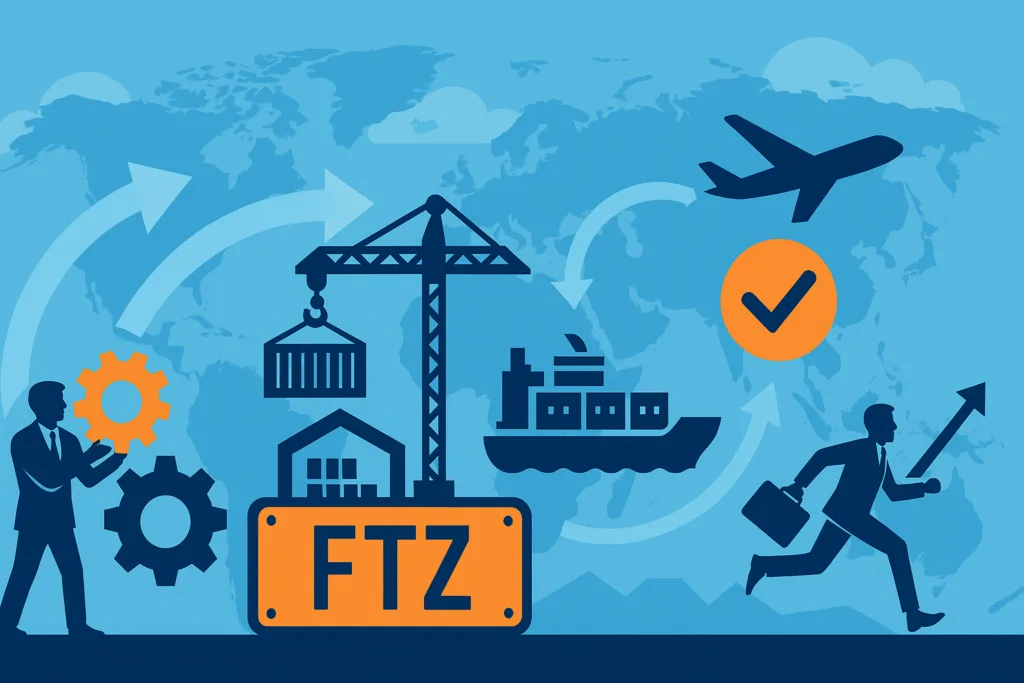Mastering FTZ Customs Compliance: Komar’s Expert Solutions for Navigating Regulations (19 CFR Part 146)
Ensure seamless Foreign Trade Zone (FTZ) customs compliance with Komar Distribution Services. Our expert solutions, backed by 15 years of experience and advanced technology, help you navigate CBP regulations (19 CFR Part 146), manage inventory control, and prepare for audits. Target Keywords: FTZ customs compliance solutions, navigating Foreign Trade Zone regulations, CBP FTZ compliance, FTZ record keeping, FTZ audit preparation, Komar FTZ software.

The Imperative of Agility in Today’s Global Trade Landscape
In the relentless and often unpredictable arena of international commerce, the ability to adapt swiftly is no longer a mere competitive advantage—it is a fundamental necessity for survival and growth. Businesses today grapple with a confluence of challenges: sudden tariff impositions, fluctuating consumer demands, geopolitical instabilities, and unforeseen supply chain disruptions, such as those witnessed during global pandemics or logistical bottlenecks. In this dynamic environment, a rigid supply chain can quickly become a liability, leading to missed opportunities, increased costs, and diminished market share. Foreign Trade Zones (FTZs) emerge as a powerful strategic instrument, offering businesses the crucial flexibility and responsiveness needed to not just weather these storms but to proactively navigate them.
Komar Distribution Services, with its deep-seated expertise built over Komar’s 15 Years of FTZ Expertise, leverages its FTZ solutions to empower companies, transforming their supply chains into models of resilience and agility. This exploration will delve into how FTZs, particularly when managed by seasoned experts like Komar, can be the cornerstone of a truly agile global trade operation, allowing businesses to optimize their processes and maintain a competitive edge. The benefits of FTZ for supply chain resilience are manifold, offering a buffer against the unexpected.
Understanding the core mechanisms of an FTZ is key to appreciating its role in fostering agility. As detailed in our comprehensive Foreign Trade Zones at Komar Distribution Services, FTZs allow for the deferral, reduction, or even elimination of customs duties, providing immediate cash flow benefits. But beyond these financial advantages, which are further explored in our [Link to Article 3: Maximizing FTZ Benefits], the operational flexibility an FTZ offers is paramount for agility. Komar’s fully activated FTZ network, including strategic locations such as our facilities in Komar’s FTZ in Savannah, GA and Komar’s FTZ in Mira Loma, CA, ensures that businesses can respond to market shifts and logistical challenges with unprecedented speed and efficiency, a capability further enhanced by our Fast-Track to FTZ Benefits with Komar processes. This network is crucial for adapting to trade disruptions with FTZ capabilities.
How Foreign Trade Zones Cultivate Supply Chain Agility
Foreign Trade Zones are specifically designed to provide operational flexibility that directly translates into enhanced supply chain agility. These secure areas, legally considered outside U.S. customs territory for duty purposes, offer several mechanisms that allow companies to pivot quickly in response to changing market dynamics. Effective FTZ tariff management becomes a significant component of this agility.
Strategic Duty Deferral: Enhancing Cash Flow and Decision-Making Flexibility
One of the most significant contributions of an FTZ to agility is the ability to defer the payment of U.S. customs duties and federal excise taxes until merchandise is withdrawn from the zone and enters the U.S. commerce. This deferral has profound implications for agility:
- Improved Cash Flow for Rapid Response: By not tying up capital in immediate duty payments upon import, companies retain liquidity. This freed-up capital can be deployed swiftly to respond to unexpected opportunities, manage sudden cost increases in other areas of the supply chain, or invest in alternative sourcing if needed. This is a cornerstone of achieving FTZ inventory flexibility.
- Strategic Market Entry: Companies can import goods into an FTZ and hold them duty-deferred, allowing them to monitor market conditions, tariff changes, or consumer demand before committing to U.S. market entry and duty payment.
